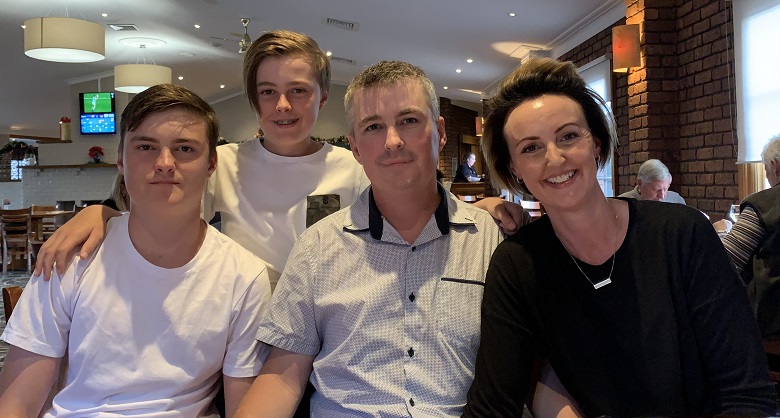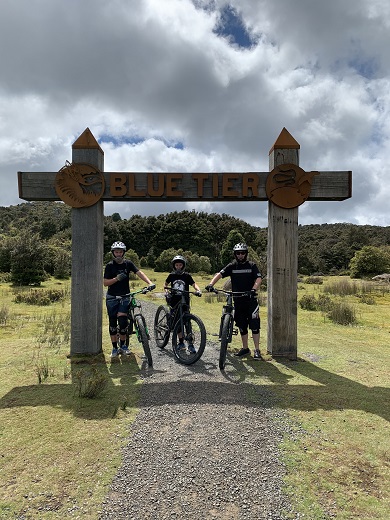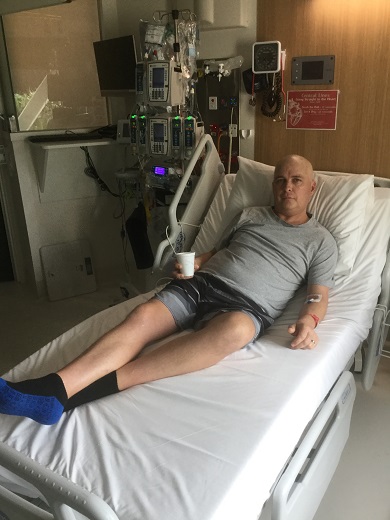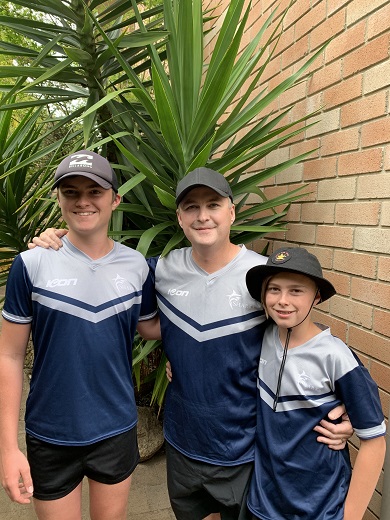Pandemic gave Mark the chance to heal at home

After a challenging bone marrow transplant in Melbourne during the height of the COVID-19 pandemic, Mark Reid was the first Tasmanian to manage a successful recovery at home with extra immune cell infusions from his donor.
In September 2019, Mark started to notice fatigue in his legs while on his regular mountain bike rides.
“It just got worse over two or three weeks and I couldn’t make it up the hills I’d normally just cruise up,” said the 45-year-old father of two.

“When I then started to struggle walking up our steep driveway, I knew it was time to go to the doctor.”
Mark was sent for a blood test in the morning and that night received a call from his doctor sending him to the leading oncologist at Royal Hobart Hospital.
“At 8:30am the next day, 3 October 2019, I was told I had acute lymphlobastic leukaemia (ALL),” remembered Mark.
“My diagnosis shocked us to the core, we felt heartbreak, sadness, fear and devastation. We had so many questions.”
Leukaemia Foundation Blood Cancer Support Coordinator, Jane was an “awesome support” to Mark and his family during this time.
“We didn’t have any idea of what to expect and it’s a massive learning curve as every individual has their own unique journey,” said Mark.
“Jane was a great sounding board to have through those first few months and we really appreciated the clarity she provided during an uncertain time.”
Mark endured six rounds of chemotherapy, multiple stays in hospital and a particularly tough biopsy requiring doctors to drill into his skull.
“Things turned very serious,” said Mark. “But the biggest challenge was yet to come.”
In March 2020, Mark and his wife, Carmon travelled to Melbourne for his bone marrow transplant.

The couple spent the next four months in Melbourne, having to leave their two sons, Colby, 15 and Charlie, 13, back home in Hobart.
“That time in Melbourne wasn’t only a huge physical fight back from the transplant but an indescribable mental battle for not only me but my whole family,” said Mark.
“I spent 34 days in hospital with the Melbourne lockdown meaning my wife could only come and see me for an hour a day for the last week of my stay.
“The isolation was almost unbearable.”
While the couple were in Melbourne, they were given a unit completely free-of-charge at the Leukaemia Foundation Patient Accommodation Centre.
“We were very lucky to be able to stay in the units straight across the road, especially with Carmon being there by herself while I was in hospital,” said Mark.
Mark underwent more aggressive treatment with 11 rounds of full body radiation to prepare him for the transplant from an unrelated matched donor.
“I slept more than I was awake during that time and had constant nausea for the next two months,” said Mark.
“I know I wouldn’t have made it through without Carmon’s constant support, picking me up every day and showing me that brighter and more positive days were ahead.”
In June 2020, Mark and Carmon were able to return home to Hobart.
“It was great to be home but my transplant still wasn’t working well,” explained Mark.
“There are two things that your transplant recovery depends on: your blood cells and your immune cells.
“My immune cells were not functioning at the level they should be, and my treatment team had to work out a strategy to make sure my transplant was successful and I wouldn’t relapse.
“This was just as the second wave of COVID-19 had hit Melbourne and my oncologist in Hobart was very concerned about sending me back into a COVID-19 hotspot.”

Instead of having to travel back to Melbourne, Mark’s treatment team organised for him to receive donor leukocyte infusions (DLI) at home from his original donor.
“This is basically a boost of immune cells from the original donor’s blood.”
“This had never been successfully done in Hobart before,” said Mark. “They organised for the cells to be frozen and sent over so I could have two infusions here at home.
“It improved my chances of transplant-success greatly and I am definitely a huge believer in the advantages of healing at home.”
Nearly 12 months on from his transplant, Mark has made a steady but strong recovery and is firmly focused on giving back to others in the blood cancer community.
“I was able to raise $15k for the Leukaemia Foundation’s Light the Night campaign and was the third highest fundraiser in the county,” said Mark.
“It’s something I am very proud of and has allowed me to give back to an organisation that gave myself and my family such incredible support.
“Even now, Jane still checks in with me and really helped me with rebuilding my life, body and mind when I returned from Melbourne, absolutely destroyed from the transplant.”
Mark is also the first Australia Marrow Match ambassador working with the organisation on an ambitious goal: that everyone who needs a transplant, has a donor match and the option of transplant.

“I couldn’t imagine being told that you haven’t got a match,” said Mark. “If you don’t, your chance of survival decreases substantially if you have ALL or other forms of leukemia.
“After my experience, I’m passionate about raising awareness and encouraging more people to sign up as donors.”
The family are feeling positive and looking forward to Mark reaching the last stage of treatment in the form of a new drug, dasatinib which was recently made available on the Pharmaceutical Benefits Scheme (PBS).
“I am feeling stronger as time goes by and constantly working on my mental and physical strength,” said Mark.
“We are now looking forward to bringing this tough time to an end, regaining and enjoying our life.”